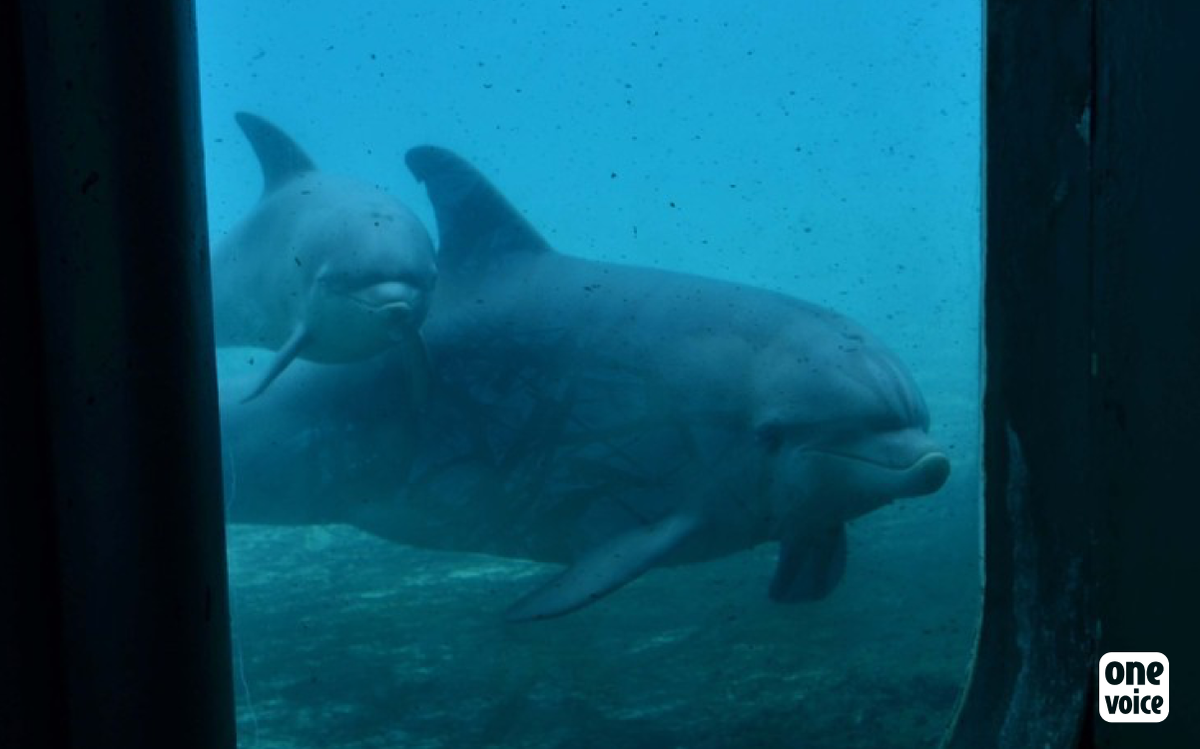

Dolphins, France against history
The Ministry of Ecology is preparing to revise the decree on dolphinariums, not to ban them as requested by One Voice, but to encourage dolphin battery farming. The few changes to be made are just a smoke screen. Enough is enough!
On November 24th 2016, One Voice had been received by the ministry regarding this subject. We brought our investigation reports, supported by the opinion of world-renowned scientists. We had been pleading for the end of this toxic industry. But the text has just been approved.
It is a shame because this decree is only a ridiculous update of a text 35 years old. It ignores the ethical advances and scientific discoveries that disrupt our view of the animal world, including a clear shift in public opinion against these pools of prison.
How can we still, in the 21st century, exhibit captive cetaceans in an aquatic circus arena?
Innumerable scientific research reveals to us today that the dolphin is endowed with a prodigious intelligence, cultures and self-awareness. The mere fact of keeping these animals born for the vastness of the ocean and to be locked up is in itself a major abuse.
What could be crueller than to deprive them of the complex social life that is the essence of their happiness, of any decision-making opportunity, of any sensory stimulation, of any long-distance group voyage or of any deep dive to the ocean bed?
The fact that there are five shows a day instead of three, three pools instead of two and a scientific committee charged with the idea of “enriching” their environment – with more balloons and rubber hoops? – This can never compensate for the lack of freedom.
The draft decree however intends to perpetuate this practice by producing “dolphins for shows” as a production line
They would like to make us believe that the born-captives are “domestic dolphins” who have miraculously adapted to the dreary life in these pools, and in less than two generations. The dramas of Lucille, killing a baby and Galéo covered with wounds, the little Aïcko, died despite of our appeals; show us enough evidence that this is not the case.
At the same time, the public has stopped being fooled
Because of their intrinsic cruelty, dolphinariums have been banned in India and banned in 14 European states. In Finland, the only dolphinarium closed due to lack of spectators. The phenomenon is now affecting the Netherlands.
Throughout Europe and the United States, a fundamental movement fuelled by social networks, documentaries and widely disseminated scientific information, is leading consumers away from these cruel spectacles. In France, an IPSOS survey conducted for One Voice on December 19th 2016, tells us that most French people are in favour of banning dolphins and orcas shows. 62% believe that cetaceans suffer from stress, 60% from boredom and depression. Finally, for more than one in two French persons, dolphins and orcas are unhappy in captivity.
In September, One Voice had already issued a warning about the content of the new decree, denouncing the policy on reproduction.
The international coalition Dolphinaria-Free Europe is now supporting us by denouncing the tentative planned developments that only validate the principle and future functioning of marine parks. But these seriously affect the individual freedom and dignity of dolphins, slaves who are forced to perform until their death. It is an insult to their sophisticated cultures, dialects, and hunting techniques to believe that balls and hoops or even contact with their trainers could actually “enrich their environment” and replace the incredible richness of a free life at sea.
Because it is impossible to really improve a dolphinariums, unless you turn it into a marine sanctuary or better still return to the ocean. In the United States, we are already preparing for this inevitable deadline. While a sanctuary in Canada is preparing to host captive orcas in 2017, the Baltimore Aquarium announces that it will move its dolphins into a closed bay in the Caribbean before 2020. In Spain discussions are underway to move the last captives of the Barcelona Zoo to Lipsi Island, after the closure of the dolphinarium.
How can France be so blind? It is only in Russia, China, Dubai or Japan that the industry of captivity continues, nourished by Taiji dolphins. Is this really the path that our country intends to follow?
The only decree that One Voice will support is therefore the one that will put in place the closure of all dolphinariums in France, through firm and progressive procedures, associated with the establishment of marine sanctuaries.